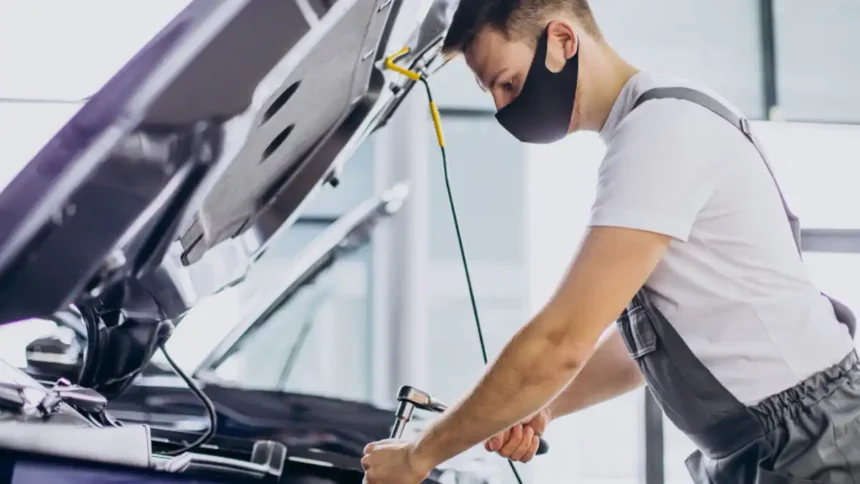Taking care of your car doesn’t have to be expensive. In fact, regular maintenance can help you avoid costly repairs down the line, keeping more money in your pocket. Whether you’re a seasoned car owner or new to maintaining your vehicle, following a few key tips can significantly reduce your overall car expenses. The best part? You don’t need to be a professional mechanic to save money with smart car maintenance habits.
This article provides money-saving tips that will help you avoid unnecessary repairs, prolong your car’s lifespan, and improve fuel efficiency, all while keeping costs down.
Here are the 10 Car Maintenance Tips to Save Money

1. Regularly Check and Change Your Oil
Changing your car’s oil is one of the simplest and most essential car maintenance tasks. Clean oil lubricates the engine, reduces friction, and keeps all the moving parts working smoothly. When oil becomes old and dirty, it loses its effectiveness, which can lead to engine overheating, wear and tear, and expensive repairs.
Money-Saving Tip:
Follow your car manufacturer’s guidelines on oil change intervals. Some newer models only need an oil change every 7,500 to 10,000 miles, which reduces the frequency and saves you money in the long run.
Quick Table: Oil Change Guidelines
| Vehicle Type | Oil Change Interval |
|---|---|
| Standard Cars | Every 5,000-7,500 miles |
| Newer Models | Every 7,500-10,000 miles |
| Performance Cars | Every 3,000-5,000 miles |
2. Maintain Proper Tire Pressure
Driving with under-inflated tires increases fuel consumption and causes your tires to wear out faster. Ensuring your tires are properly inflated not only improves gas mileage but also helps avoid premature tire replacement, which can be a costly affair.
Money-Saving Tip:
Invest in a tire pressure gauge and check your tires once a month. Keeping them inflated to the correct pressure improves fuel economy and prolongs the life of your tires.
Tire Maintenance Checklist:
- Check tire pressure monthly.
- Rotate tires every 6,000 miles.
- Replace tires when tread depth reaches 2/32 of an inch.
3. Replace Air Filters Regularly
Your car’s air filters keep dust and debris from entering the engine. A clogged filter reduces airflow, making your engine work harder, which decreases fuel efficiency and could cause long-term damage.
Money-Saving Tip:
Air filters are inexpensive and can be replaced easily. Most manufacturers recommend replacing them every 12,000 to 15,000 miles. This simple step can improve fuel efficiency and avoid costly engine repairs.
4. Inspect and Replace Brake Pads
Worn brake pads can lead to damage to the rotors and more expensive brake system repairs. Replacing brake pads when they’re worn down is a much cheaper alternative to replacing the entire braking system.
Money-Saving Tip:
Check your brake pads regularly, and don’t ignore squeaking or grinding sounds when you brake. Replacing pads as soon as they show signs of wear will save you from costly rotor or caliper replacements.
5. Keep Your Car’s Fluids in Check
Beyond oil, your car relies on several other fluids, including coolant, transmission fluid, brake fluid, and power steering fluid. Each of these plays a crucial role in your car’s performance, and low levels can lead to serious damage or system failure.
Money-Saving Tip:
Regularly check your car’s fluid levels and top them off as necessary. Doing so can prevent costly repairs due to overheating, transmission issues, or brake failure.
6. Replace Windshield Wipers Before They Wear Out
Worn-out windshield wipers can reduce visibility during rain or snow, creating a dangerous driving situation. If you let your wipers deteriorate too much, they can also damage your windshield, leading to a costly replacement.
Money-Saving Tip:
Replace your wiper blades every six months or as soon as you notice they are leaving streaks or squeaking. It’s a small expense that can save you from costly windshield repairs.
7. Rotate Your Tires for Even Wear
Tires wear out at different rates depending on their position. Rotating your tires every 6,000 to 8,000 miles ensures even wear, which prolongs the life of the tires and saves you from buying new tires prematurely.
Money-Saving Tip:
When you rotate your tires regularly, you extend their lifespan, which means fewer replacements over time. Proper tire rotation also improves vehicle handling and fuel efficiency.
8. Perform a Battery Check
A dead battery can leave you stranded and lead to expensive towing or service charges. Ensuring that your battery is functioning properly will help you avoid sudden failures and the costs that come with them.
Money-Saving Tip:
Have your battery tested during regular maintenance checkups, especially before winter. Replace the battery if it’s nearing the end of its lifespan, typically after 3-5 years. This can save you from an unexpected breakdown.
9. Address Small Repairs Early
That tiny chip in your windshield or a minor engine noise may seem like a small issue, but ignoring it can lead to much bigger and more expensive problems down the road. Small repairs left unattended often escalate into major repairs.
Money-Saving Tip:
Tackle small repairs as soon as you notice them. Addressing minor issues early can save you hundreds or even thousands of dollars in the long run. For example, fixing a small windshield chip is much cheaper than replacing the entire windshield.
10. Drive Smoothly to Extend Your Car’s Lifespan
How you drive can have a significant impact on your car’s health. Harsh braking, rapid acceleration, and constant stop-and-go driving all cause unnecessary strain on your vehicle’s engine, brakes, and transmission, which can lead to costly repairs.
Money-Saving Tip:
Drive smoothly and avoid aggressive driving habits. Not only will this prolong the life of your car’s key components, but it will also improve fuel efficiency, helping you save at the pump.
FAQs on Car Maintenance and Saving Money
Q1: How often should I rotate my tires?
A: Tire rotation should be done every 6,000 to 8,000 miles to ensure even wear. Check your vehicle’s manual for specific recommendations.
Q2: What happens if I delay an oil change?
A: Delaying an oil change can lead to engine wear and tear, reduced performance, and in extreme cases, engine failure. Following your manufacturer’s recommended oil change interval helps avoid these costly issues.
Q3: Can I use generic parts for car repairs?
A: Yes, using aftermarket parts is often a cost-effective solution. Just ensure the parts are compatible with your vehicle, and always consult with your mechanic for advice on quality and reliability.
Conclusion
Maintaining your vehicle doesn’t have to drain your wallet. By following these money-saving tips, you can avoid unnecessary repairs, extend your car’s lifespan, and even improve fuel efficiency. Whether it’s keeping an eye on your tire pressure, regularly changing your oil, or addressing small repairs early, each step you take can make a big difference in your car’s performance and your budget.
Remember, the key to car maintenance is consistency. Stay proactive with your vehicle’s upkeep, and you’ll save both time and money in the long run. So start applying these practical tips today, and watch as your maintenance costs shrink while your savings grow!








